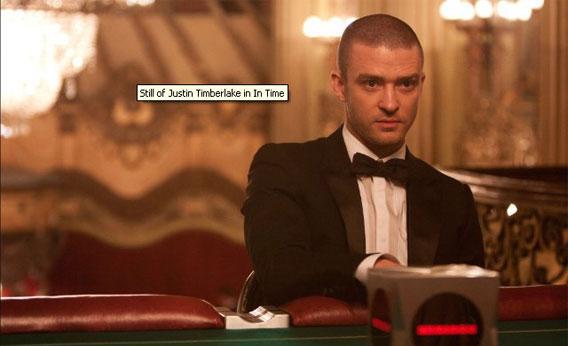What follow is an imagined dialogue between the characters in In Time (20th-Century Fox):
First character: Shall I elucidate our movie’s high-concept premise about a dystopic future where time is, quite literally, money?
Second character: Please do! And my rejoinder will further explore the laws of this universe, where humans are genetically programmed to live only till age 25. After that, everyone stops aging and dies in exactly one year, unless they are able to buy, borrow, or steal themselves more time.
First character: So time in our world is basically like digitized currency, with each person’s arm bearing a readout of how many days, hours, minutes, and seconds they have left?
Second character: That’s right. And for some reason, every conversation in the future revolves around this fact.
Third character (bursting in with a gun): Your money or your life! Oh, I forgot: Your money is your life.
That last is a real line of dialogue in Andrew Niccol’s bizarrely stilted sci-fi thriller In Time, a movie so consistently flat-footed, with pauses between lines of dialogue so vast, that you begin to wonder if the whole thing might be a psychological experiment of some kind. Is Niccol (who wrote and directed the similarly themed genetic-engineering thriller Gattaca) trying to force audiences to experience this futuristic temporal dilemma from the inside, by making us excruciatingly aware of the passage … of … time? Or has he just made a really dull movie?
Will Salas (Justin Timberlake) lives in the ghetto with his disturbingly hot mother (Olivia Wilde), eking out a living one day (or more often, minute) at a time. When he watches her “time out” and expire in his arms, Will swears to get revenge on the system that allows rich people to accumulate thousand-year lifespans while the poor drop dead in the prime of their lives. A generous stranger (Matt Bomer) gives Will the gift of 100 years, allowing him to cross the border into a fancier “time zone” where he runs afoul of a time-hoarding tycoon (Mad Men’s Vincent Kartheiser) with a pretty, rebellious daughter, Sylvia (Amanda Seyfried, looking like Anna Karina in long false eyelashes and a bobbed wig).
A few chase scenes later, Will and Sylvia are Bonnie-and-Clyde-style bank robbers on the lam, stealing not bags of cash but rectangular digital thingamabobs in which surplus time is stored. They distribute these freely to the time-starved masses, destabilizing the social order. So a specialized cop known as a “timekeeper” (Cillian Murphy) is sent out to track the couple down—but will he himself run out of time before he can find them?
On the page Niccol’s premise sounds cerebral and edgy, like something out of a Philip K. Dick novel, but In Time never takes advantages of the opportunities for political allegory or social critique that its story affords. The action proceeds sluggishly, with random bursts of violence (many of them perpetrated by Alex Pettyfer as a snide, time-thieving gang leader). And my rendering of the dialogue above is an exaggeration, but only a slight one. These people don’t do a lot with their preciously guarded lifespans other than compare the rapidly diminishing digits on their wrists and make plays on words involving time. There are a few laugh lines, but for the most part they seem unintentional: “Four minutes for a cup of coffee?” complains Timberlake in one scene.
Maybe part of this movie’s essential flimsiness has to do with the fact that everyone in sight is not just 25 years old but as slim and attractive as if they’d just walked out of an L.A. health-food store. There’s an occasional child here and there, but no gray hair, no wrinkled foreheads, not even any schlumpy clothes—apparently even in the hardscrabble time-ghettos of the future, everyone can afford to spend their hard-earned minutes at Diesel. This vision of the future as an extended jeans commercial could have been the starting point for a critique of our culture’s fear of aging, but we never learn why the invisible powers-that-be first decided to institute this cruel form of time-based capitalism. And though there’s a vaguely socialist theme of wealth redistribution running through the film, it’s never clear what the final goal is for the two time bandits in love: Are they looking to abolish the time-is-money system altogether, or just eke out a few more years for the downtrodden? By the end of this stiff, plodding movie, I was no longer engaged enough to care. Sometimes it’s a relief when the clock ticks down to zero.
